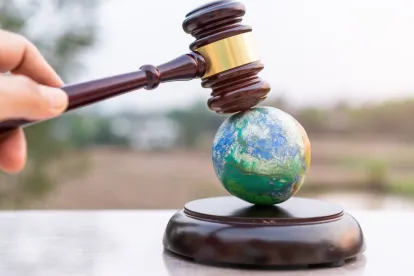At a recent conference, the newly confirmed Assistant Attorney General for the Environment and Natural Resources Division (ENRD), Todd Kim, delivered remarks strongly signaling an increased focus on prosecuting companies and individuals for environmental crimes, and placing a priority on all other enforcement. The remarks also emphasized two top Biden Administration priorities: tackling climate issues and promoting environmental justice.
DOJ Environmental Crimes Section (ECS) Chief Deborah Harris spoke later in the conference and echoed Assistant Attorney General (AAG) Kim’s remarks, predicting “more vigorous enforcement as opposed to just aiming for compliance.”
DOJ’s Four Priorities for Companies
Through increased enforcement of corporations, AAG Kim explained that DOJ aims to “promote a corporate culture that fosters strict attention to law,” in recognition that “decisions made in the day-to-day operation of corporations can control the environmental health of the American people.” AAG Kim was direct about what the government wants to see from companies:
-
Integrate environmental compliance into the culture of your company.
-
Institute systems that foster decision-making that improves environmental and health outcomes.
-
Ensure that, if environmental problems arise, your company has systems in place to investigate, determine, and document what went wrong, and why.
-
Establish and enforce systems of accountability all the way up the corporate chain for environmental issues.
In response to questions by B&D Principal John Cruden, a former AAG for the ENRD himself, AAG Kim made the following additional points:
-
The past initiatives from the Obama Administration on worker endangerment (partnering with OSHA) and animal cruelty would have renewed support.
-
Although ENRD does not have a specific policy concerning corporate governance, the Division can draw from the recent criminal division policy in that regard.
-
Citing to the DAG Monaco memorandum, AAG Kim stressed that enforcement of the criminal provisions of environmental laws is a priority and emphasized that criminal prosecution will not be limited solely to environmental statutes; DOJ will utilize other criminal laws to the extent possible, including Title 18 offenses of fraud, conspiracy and obstruction of justice.
Suggested Actions
Based on DOJ’s recent remarks emphasizing that “corporate environmental compliance is vital,” companies should prepare now to mitigate potential enforcement risks. Corporate boards will want to promote a corporate culture of compliance and lawfulness, and encourage management to prioritize remediation, safety, and environmental awareness. Some steps to consider are:
-
Management should make sure their compliance program and related protocols are up to date and meet the demands of this new enforcement priority.
-
Test the effectiveness of your company’s compliance detection systems and related internal record-keeping.
-
Conduct an environmental justice risk audit and develop a strategy for the same.
-
Examine individual employee training related to relevant industry-specific regulations and employee understanding of relevant company policies and procedures, and evaluate related record-keeping.
-
Confirm “lessons-learned” are promptly incorporated into the compliance program and that otherwise the compliance program is evaluated and updated regularly.
-
Ensure the appropriate allocation of resources for environmental compliance programming.
-
Review and conduct risk-assessment audits for your company’s supply chain participants to include periodic debarment registry checks.
-
Corporate EHS officials should review the June 1, 2020, updated guidance from DOJ’s Criminal Division to its prosecutors on how to evaluate the design, implementation, and effective operation of corporate compliance programs in determining whether, and to what extent, the DOJ considers a corporation’s compliance program to have been effective at the time of the offense and to be effective at the time of a charging decision or resolution. (See here for additional tips on strengthening corporate compliance programs.)
Priority Areas for Environmental Crimes Prosecutions
It is likely ENRD will focus on the following key enforcement target areas: emissions of greenhouse gases, supply chain issues, illegal logging and other potential Lacey Act violations, vessel pollution, cases involving the integrity of renewable energy programs, flaring cases, worker safety issues, and any violation, civil or criminal, implicating environmental justice.






 />i
/>i

